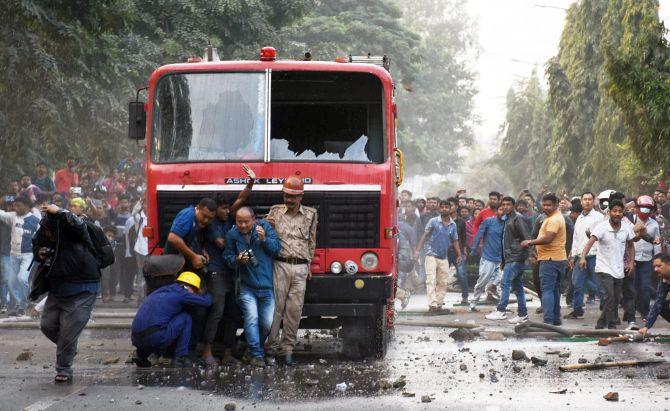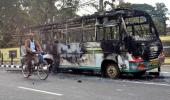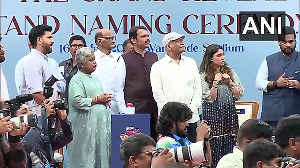'In terms of sheer incompetence, this government has rivaled the Rajiv Gandhi-led government that was derisively called the 'Baba-log' government for its naïve handling of many issues,' notes Colonel Anil A Athale (retd).

Till the horrible events of 1984 overtook it, the Mandai massacre of Bengali settlers by tribals in Tripura in June 1980 was the worst such incident in India.
Ever since the Tripura revolt by the tribals against the demographic change of the post Partition era, the entire north east is in the dread of a similar demographic change befalling them.
The anti-Bengali agitation in 1980s led by the All Assam Students Union had a direct link to the Tripura events. The Indian Army's 'Operation Garam Hawa' (so named by me as a staff officer handling it) was the longest running such operation in the history of independent India.
The unnecessarily harsh language used against Bangladesh and Afghanistan in the bill and during the debate in Parliament, has rightly annoyed these countries.
In terms of sheer incompetence, this government has rivaled the Rajiv Gandhi-led government that was derisively called the 'Baba-log' government for its naïve handling of many issues.
Let me make it clear that I fully support the move to grant citizenship to persecuted minorities from our neighbouring countries. But by our extraordinary stupidity in the use of offensive language, we have given a handle to all manner of busy bodies to smear us with the tag of 'intolerance' and 'discrimination' etc.
Without mentioning Hindus, Christians etc had the bill just mentioned 'persecuted religious minorities', it would have achieved the same result.
If the government's aim was (rightly) to exclude the majority in those countries, it would have been achieved without giving a chance to busy bodies in the US, UN and elsewhere to criticize India for a perfectly acceptable humanitarian gesture.
This bill and the related debate has rightly incensed friendly regimes in Bangladesh and Afghanistan. Here again, it should have been made clear that in Afghanistan it was the Taliban that carried out these atrocities and created fear.
In the case of Bangladesh, the blame for persecution of minorities lies at the doorstep of then military regime of General H M Ershad. Sheikh Hasina Wajid's current government in Dhaka should have been rightly lauded for its tolerance and liberal policies.
This mishandling reminds one of the remarks often made about the early 20th century Kaiser William II that he 'wounded un-necessarily and wooed unsuccessfully'.
This brings me to the current turmoil in the north east. Even a cursory reading of voluminous data with the Indian Army's Eastern Command or Intelligence Bureau records could have shown the depth of dread in the north east of being swamped by Bangladeshis.
No assurances are going to satisfy this primordial fear as on the ground the facts are otherwise. Despite the Inner Line Permit system etc, the reality is that colonies of Bangladeshi settlers have sprung up in the entire north east.
Like air, populations have a tendency to flow from high density to low density areas. Border fences and other checks could and have stopped this flow to some extent, but have not really stopped it. In addition to this is the fact that the Bangladeshis are far more prolific procreators -- the population growth figures tell their own story.
It is unfair to expect the states of the north east alone to bear the burden of refugees.
What was needed was a national consensus amongst all the states of the Union to accept their share of refugees. In addition, there is another way out of this dilemma, that of populating the Andaman and Nicobar islands.
India has close to 49 un-inhabited islands in the Andamans. There is great danger of these islands being encroached upon by others. Lack of habitation also makes it difficult to police these areas and prevent marine poaching in the seas.
Populating these far flung areas would serve the needs of national security and contribute long term to the national economy. A commitment on these lines and actions will go a long way in assuaging the fears in the north east.
All these actions could have been taken before the passing of the Citizenship Amendment Bill. The inefficiency is indeed extraordinary, but not surprising.
I wish to recall that when the Government of India carried out demonetisation on November 8, 2016, there was a problem of carrying new currency to remote areas.
It was extraordinary that until I, a mere private citizen, contacted various authorities to suggest that we should use the resources of the Indian Air Force, which had an airfield (Ozar) near the currency printing press in Nashik, the babus hadn't woken up!
Partly, the Citizenship Amendment Act mess is due to the systemic flaw of thinking and acting in silos, no awareness of history, over centraliaation and hubris at the leadership level.
Colonel Anil A Athale is a military historian and a frequent contributor to Rediff.com.
Earlier this week, Colonel Athale argued that the Citizenship Amendment Bill must include all persecuted peoples.











